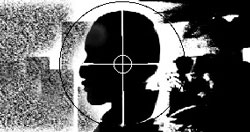
WASHINGTON (FinalCall.com) – Government law enforcement agencies have expanded the practice of racial profiling in the so-called “war on terror,” and that “pervasive focus on race” undermines national security rather than improves it, according to a new report from Amnesty International USA (AIUSA).
The 50-page report says that there are an estimated 32 million victims of racial profiling in the U.S.; one in nine, and an estimated 87 million are at risk of being subjected to racial profiling, and that it occurs while individuals are walking, driving, shopping, flying, sitting at home or worshiping.
The public has become less sensitive to human rights abuses by the government in the wake of 9/11.
–Curt Goering, Amnesty International
“Regardless of exactly what the statistical data suggests, we have a serious problem. And it is not only a problem of human dignity. That is a fundamental and very important matter,” former federal judge Tim Lewis, chair of Amnesty International National Hearings on racial profiling, told The Final Call. “As the hearings also reflected, and this came directly from members of the law enforcement community, it is bad law enforcement. It depletes where the real focus should be, which is on criminal behavior, criminal activity, as opposed to preconceived notions of the behavior of groups of Americans. That makes us all less safe in the long run,” Mr. Lewis said.
The report also says that the use of race, religion, country of origin, or ethnic and religious appearance as a proxy for criminal suspicion actually undermines national security.
“Racial profiling blinds law enforcement to real criminal threats and creates a hole in the national security net large enough to drive a truck through,” Curt Goering, senior deputy executive director of AIUSA, told reporters.
“The measures that the President has undertaken so far, the statement that he’s made, is only rhetoric and it has not been followed up by any meaningful action,” Mr. Goering told The Final Call. “So, it’s a huge human rights problem, but it’s also a huge threat as our country continues to deal with the threats presented by the ‘War on Terror’ because we have the illusion that there is law enforcement looking after potential threats.
“But in fact, when we focus on characteristics of people, when we focus on individuals because of their race, or their national origin, or their religion, people who don’t fit that profile, who may be planning the next attack, may not be noticed. It’s a counter-productive technique.”
The public has become less sensitive to human rights abuses by the government in the wake of 9/11, said Mr. Goering. Pre-Sept. 11, 2001, there was some progress in the direction of ending racial profiling, he said. “Post-9/11, there is a fear. The public is anxious. They’re confused about what effective steps can be taken. Now there appears to be broader public support and it’s important that people understand that this is not a solution to the problem, in fact it detracts from the harder work of looking at behaviors, looking at access to certain kind of weaponry, or chemicals for example–the behaviors that might indicate some pre-attack disposition.”
The AIUSA panel heard testimony from Native Americans who were profiled going to and from religious ceremonies; Hispanics who were profiled in the sanctity of their homes, Blacks who were profiled walking down the street, and even a Boy Scout–who happens to be Muslim–constantly being subjected to airport searches.
“Racial profiling is so pervasive and widely accepted that it has become a corrosive acid on this nation’s spirit of unity,” Benjamin Jealous, AIUSA’s domestic human rights program director, told reporters.
In fact, Mr. Lewis was himself profiled, while he was a sitting judge on the federal bench. “This problem is endemic to the law enforcement community now and we have to address it. Nothing that happened on Sept. 11 or in its wake excuses this kind of a violation of Constitutional principles,” said Judge Lewis.
Racism and racial discrimination are “endemic to law enforcement,” according to Matthew Fogg, a Black officer and expert who has fought against racism as a U.S. Marshall.
“If I’ve got a biased tendency, if I specifically have biased motives, I can use that badge, and under the cover of that badge in law enforcement, and do what I want,” he said.
He recalled an incident with one of his special agents in charge while conducting drug and gun interdiction. They argued over going into affluent White areas to make arrests on drugs and guns.
“His argument was: If we go out there, there’s a chance our operations will be scrutinized, because of the fact that we’re going after high-level children and people who have influence on systems. So, the bottom line was: Let’s just stick to the weakest link and get our numbers up. And that turned out to be Black and Brown people,” Mr. Fogg said.
The focus on race is in fact an easy “distraction” said Mr. Goering. “It’s harder to focus on behavior. Some law enforcement people have coined the profiling, the focus on race or religion as the ‘lazy approach to law enforcement.’”












